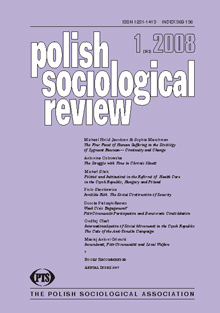Incumbents, Post-Communists and Local Welfare: Disentangling the Aggregate-Level Economic Voting Regularities in 2002 and 2006 City President Election
Incumbents, Post-Communists and Local Welfare: Disentangling the Aggregate-Level Economic Voting Regularities in 2002 and 2006 City President Election
Author(s): Maciej Antoni GóreckiSubject(s): Social Sciences
Published by: Polskie Towarzystwo Socjologiczne
Keywords: conventional and transitional economic voting; city president elections in Poland
Summary/Abstract: In this paper, I examine the patterns of economic voting in 2002 and 2006 city president elections in largest Polish cities. I draw on the conceptual distinction between "conventional" and "transitional" economic voting. While the former concept stresses a general positive link between economic welfare and the results gained by incumbents, the latter, developed in course of studies on the post-communist countries, emphasises a negative relationship between welfare and the electoral fortunes of post-communist parties and candidates. Relying on aggregate-level data relating to 2002 and 2006 city president elections, I conduct analyses suggesting that both types of economic voting can be observed at the local level in Poland. On one hand, the electoral achievements of incumbents in the cities with high average wages tend to be greater than in the case of the cities with low average wages. On the other, low average level of wages favours presidential candidates affiliated with the post-communist party. Moreover, there is suggestive evidence that incumbency status interacts with affiliation with the post-communist party. The results tend to be robust with respect to different model specifications, including those accounting for unobserved heterogeneity.
Journal: Polish Sociological Review
- Issue Year: 161/2008
- Issue No: 1
- Page Range: 103-117
- Page Count: 14
- Language: English

